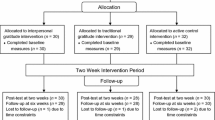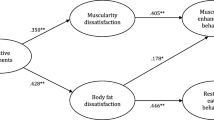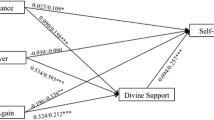Abstract
Gossip is a frequent social activity, yet there is little research on the experience of providing gossip and how it impacts upon well-being of the gossiper. The present research aimed to investigate the effect of gossip behavior on the self-esteem of the gossiper. In Study 1, 140 participants were asked to write either a positive or negative description of a target person. Self-esteem was significantly reduced after providing a negative description but there was no effect of providing a positive one. In Study 2, 112 participants were asked to share information about someone they knew. Self-esteem decreased significantly regardless of the valence of the information. This research suggests that the act of gossiping is one which leads to self‐criticism regardless of valence.
Similar content being viewed by others
References
Barkow, J. H. (1992). Beneath new culture is old psychology: Gossip and social stratification. In J. H. Barkow, L. Cosmides, & J. Tooby (Eds.), The adapted mind (pp. 627–637). Oxford: Oxford University Press.
Baumeister, R. F., Zhang, L., & Vohs, K. D. (2004). Gossip as cultural learning. Review of General Psychology, 8, 111–121. doi:10.1037/1089-2680.8.2.111.
Blumberg, H. H. (1972). Communication of interpersonal evaluations. Journal of Personality and Social Psychology, 23, 157–162. doi:10.1037/h0033027.
Bok, S. (1983). Secrets: On the ethics of concealment and revelation. New York: Pantheon Books.
Dunbar, R. I. M. (2004). Gossip in evolutionary perspective. Review of General Psychology, 8, 100–110. doi:10.1037/1089-2680.8.2.100.
Dunbar, R. I. M., Marriott, A., & Duncan, N. D. C. (1997). Human conversational behavior. Human Nature, 8, 231–246. doi:10.1007/BF02912493.
Einarsen, S., & Skogstad, A. (1996). Bullying at work: epidemiological findings in public and private organizations. European Work and Organizational Psychologist, 5, 185–201. doi:10.1080/13594329608414854.
Emler, N. (1990). A social psychology of reputation. European Review of Social Psychology, 1, 171–193. doi:10.1080/14792779108401861.
Enquist, M., & Leimar, O. (1993). The evolution of cooperation in mobile organisms. Animal Behavior, 45, 747–757. doi:10.1006/anbe.1993.1089.
Farley, S. D. (2011). Is gossip power? The inverse relationships between gossip, power, and likability. European Journal of Social Psychology, 41(5), 574–579. doi:10.1002/ejsp.821.
Farley, S. D., Timme, D. R., & Hart, J. (2010). On coffee talk and break-room chatter: perceptions of women who gossip in the workplace. Journal of Social Psychology, 150, 361–368. doi:10.1080/00224540903365430.
Fine, G. A., & Rosnow, R. L. (1978). Gossip, gossipers, gossiping. Personality and Social Psychology Bulletin, 4, 161–168. doi:10.1177/014616727800400135.
Foster, E. K. (2004). Research on gossip: taxonomy, methods, and future directions. Review of General Psychology, 8, 78–99. doi:10.1037/1089-2680.8.2.78.
Holtgraves, T. (2001). Politness. In W. P. Robinson & H. Giles (Eds.), The new handbook of language and social psychology (pp. 341–355). West Sussex: Wiley.
Jaeger, M. E., Skleder, A. A., Rind, B., & Rosnow, R. L. (1994). Gossip, gossipers and gossipees. In A. Ben-Ze’ev & R. Goodman (Eds.), Good gossip. Lawrence: Press of the University of Kansas.
Leaper, C., & Holliday, H. (1995). Gossip in same-gender and cross-gender friends’ conversations. Personal Relationships, 2, 237–246. doi:10.1007/BF01954575.
Lewicka, M., Czapinksi, J., & Peeters, G. (1992). Positive–negative asymmetry or ‘When the heart needs a reason’. European Journal of Social Psychology, 22, 425–434. doi:10.1002/ejsp.2420220502.
Marques, J. M., Yzerbyt, V. Y., & Leyens, J.-P. (1988). The black sheep effect: extremity of judgments towards ingroup members as a function of group identification. European Journal of Social Psychology, 18, 1–16. doi:10.1002/ejsp.2420180102.
O’Connor, L. E., Berry, J. W., & Weiss, J. (1999). Interpersonal guilt, shame, and psychological problems. Journal of Social and Clinical Psychology, 18, 181–203. doi:10.1521/jscp.1999.18.2.181.
Peters, K., & Kashima, Y. (2007). From social talk to social action: shaping the social triad with emotion sharing. Journal of Personality and Social Psychology, 93, 780–797. doi:10.1037/0022-3514.93.5.780.
Rosenberg, M. (1965). Society and the adolescent self-image. Princeton: Princeton. University Press.
Rosnow, R. L., & Fine, G. A. (1976). Rumor and gossip: The social psychology of hearsay. New York: Elsevier.
Skowronski, J. J., & Carlston, D. E. (1987). Social judgment and social memory: The role of cue diagnosticity in negativity, positivity and extremity biases. Journal of Personality and Social Psychology, 52(4), 689–699.
Stirling, R. B. (1956). Some psychological mechanisms operative in gossip. Social Forces, 34, 262–267. doi:10.2307/2574050.
Taylor, G. (1994). Gossip as moral talk. In R. F. Goodman & A. Ben-Ze-ev (Eds.), Good gossip (pp. 34–47). Lawrence: University Press of Kansas.
Turner, M. M., Mazur, M. A., Wendel, N., & Wilmslow, R. (2003). Relational ruin or social glue? The joint effect of relationship type and gossip valence on liking, trust, and expertise. Communication Monographs, 70, 129–141. doi:10.1080/0363775032000133782.
Uysal, A., & Oner-Ozkan, B. (2007). A self-presentational approach to transmission of good and bad news. Social Behavior and Personality, 35, 63–78. doi:10.2224/sbp.2007.35.1.63.
Wilson, D. S., Wilczynski, C., Wells, A., & Weiser, L. (2002). Gossip and other aspects of language as group-level adaptations. In C. Heyes & L. Huber (Eds.), The evolution of cognition (pp. 347–365). Cambridge: MIT Press.
Yerkovich, S. (1977). Gossip as a way of speaking. Journal of Communication, 26, 192–196. doi:10.1111/j.1460-2466.1977.tb01817.x.
Author information
Authors and Affiliations
Corresponding author
Rights and permissions
About this article
Cite this article
Cole, J.M., Scrivener, H. Short Term Effects of Gossip Behavior on Self-Esteem. Curr Psychol 32, 252–260 (2013). https://doi.org/10.1007/s12144-013-9176-3
Published:
Issue Date:
DOI: https://doi.org/10.1007/s12144-013-9176-3




